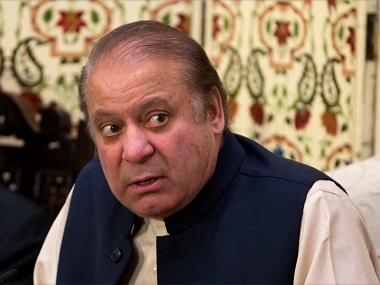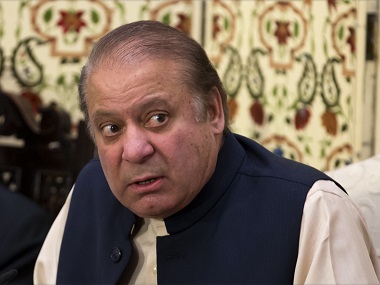Never a dull moment in Pakistan. It is not known whether Netflix is interested in the script but in the latest episode of a riveting new season in the Nawaz Sharif biopic, an anti-graft tribunal has convicted the ousted prime minister in a corruption case and handed him a 10-year prison term. Maryam Nawaz, his daughter and heir apparent of PML-N, was sentenced to seven years in jail and her husband Muhammad Safdar got a one-year term. [caption id=“attachment_4689041” align=“alignleft” width=“380”] File image of Nawaz Sharif. AP[/caption] It seems the general headquarters in Rawalpindi has finally figured out that it is much better to rule via a civilian proxy within a faux democratic setup than stage a formal coup and risk global opprobrium. The White House is no longer what it used to be and who knows how long Chinese generosity will last? If the pesky Sharif can be forced into a self-exile and his party cut down to size, it could be easier to fix the impending elections in favour of Imran Khan, who apparently wants to “
carry the army with him
”. Even in his hour of anxiety, Sharif might be struggling to stifle a smirk. Those who ignore lessons of history are doomed to repeat it. Pakistan is caught in a self-created time warp. Once a blue-eyed boy of the Rawalpindi GHq, Sharif was propped up to counter the Benazir Bhutto threat. The machinations that once saw the former Punjab chief minister rise to premiership in 1990 now lie at the root of his possible exile. As Hudson Institute director Husain Haqqani, former Pakistan ambassador to the US, wrote in The Print
, “Sharif was initially a Zia-ul-Haq protégé and was backed by the military-intelligence complex that feared the electoral success of Bhutto’s PPP. For 30 years – from 1977 to 2007, when Benazir Bhutto was assassinated – Pakistani politics was manipulated by the military-led establishment in an effort to contain the younger Bhutto and her party.” The wheel has come full circle for Sharif who was elected thrice to the prime minister’s chair but could never complete office even once. In his third term as prime minister, Sharif pushed back against military control over civil administration and sought to create a semblance of space to direct the course of Pakistan’s security and foreign policy. He clearly overplayed his hands. The extraordinary events of October 2016 when the civilian government went into a direct confrontation with the military over the army’s handling of terror assets were the culmination of his power. The seeds of his downfall, ironically, were sown on that fateful day. Sharif wanted the military-intelligence agencies “not to interfere if law enforcement acts against militant groups that are banned or until now considered off-limits for civilian action,” scooped Cyril Almeida of
Dawn
. The Pakistan prime minister also wanted to conclude “the Pathankot investigation and restart the stalled Mumbai attacks-related trials in a Rawalpindi anti-terrorism court.” These were sacrilegious, blasphemous acts and a cardinal sin in Pakistan where sanity has been banished outside the borders. For all his electoral influence, Sharif created powerful enemies within the military and the very forces that once worked in his favour were now working overtime to remove him. His wings needed to be urgently clipped. The judiciary added one more dimension in this sordid game. Military overthrows are risky in the age of social media. Easier to co opt the judiciary and add a layer of legitimacy to a softer coup.
File image of Nawaz Sharif. AP[/caption] It seems the general headquarters in Rawalpindi has finally figured out that it is much better to rule via a civilian proxy within a faux democratic setup than stage a formal coup and risk global opprobrium. The White House is no longer what it used to be and who knows how long Chinese generosity will last? If the pesky Sharif can be forced into a self-exile and his party cut down to size, it could be easier to fix the impending elections in favour of Imran Khan, who apparently wants to “
carry the army with him
”. Even in his hour of anxiety, Sharif might be struggling to stifle a smirk. Those who ignore lessons of history are doomed to repeat it. Pakistan is caught in a self-created time warp. Once a blue-eyed boy of the Rawalpindi GHq, Sharif was propped up to counter the Benazir Bhutto threat. The machinations that once saw the former Punjab chief minister rise to premiership in 1990 now lie at the root of his possible exile. As Hudson Institute director Husain Haqqani, former Pakistan ambassador to the US, wrote in The Print
, “Sharif was initially a Zia-ul-Haq protégé and was backed by the military-intelligence complex that feared the electoral success of Bhutto’s PPP. For 30 years – from 1977 to 2007, when Benazir Bhutto was assassinated – Pakistani politics was manipulated by the military-led establishment in an effort to contain the younger Bhutto and her party.” The wheel has come full circle for Sharif who was elected thrice to the prime minister’s chair but could never complete office even once. In his third term as prime minister, Sharif pushed back against military control over civil administration and sought to create a semblance of space to direct the course of Pakistan’s security and foreign policy. He clearly overplayed his hands. The extraordinary events of October 2016 when the civilian government went into a direct confrontation with the military over the army’s handling of terror assets were the culmination of his power. The seeds of his downfall, ironically, were sown on that fateful day. Sharif wanted the military-intelligence agencies “not to interfere if law enforcement acts against militant groups that are banned or until now considered off-limits for civilian action,” scooped Cyril Almeida of
Dawn
. The Pakistan prime minister also wanted to conclude “the Pathankot investigation and restart the stalled Mumbai attacks-related trials in a Rawalpindi anti-terrorism court.” These were sacrilegious, blasphemous acts and a cardinal sin in Pakistan where sanity has been banished outside the borders. For all his electoral influence, Sharif created powerful enemies within the military and the very forces that once worked in his favour were now working overtime to remove him. His wings needed to be urgently clipped. The judiciary added one more dimension in this sordid game. Military overthrows are risky in the age of social media. Easier to co opt the judiciary and add a layer of legitimacy to a softer coup.
“The judgment had been written even before the trial started,” wrote Sushant Sareen in Daily-O . “The court proceedings were a mere formality being observed to maintain the charade of due process and the fiction of a fair trial.” It is difficult to argue that Sharif and his family members are squeaky clean. They are not. The money trail leaked through the Panama Papers point to a murky trail that winds its way around the world and ends in posh London flats, and is symptomatic of an endemic corruption that defines the country’s venal elite. His ouster might even have backing among the masses who remain ill-administrated, impoverished and alienated. Yet the fate that befell Sharif and his family has less to do with corruption and more to do with his audacity to stand up to the country’s powerful military and prevent it from intruding into and manipulating civilian administration. The Panama Papers scandal, in this case, became a handy tool to mask the military’s attempt to remove Sharif and undermine the democratic process. Sharif’s sentencing is the logical conclusion of the task that the military-intelligence establishment, with generous help from the judiciary, had initiated to finish his political career and remove him as a threat. Imran Khan might be licking his chops but may do well to watch the proceedings closely. The wheel of fate is a tricky device.
)